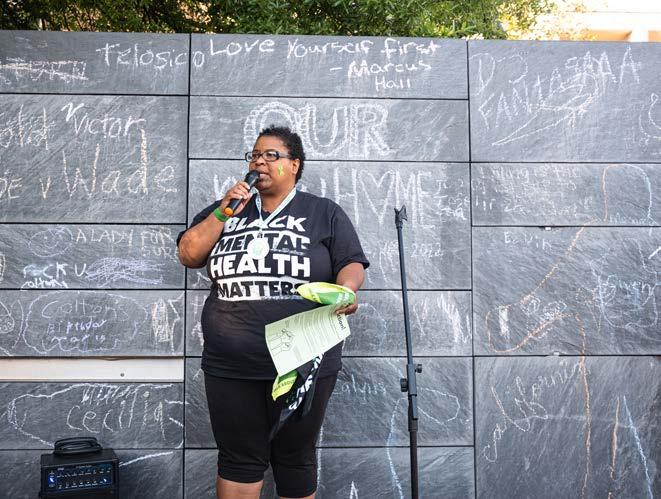
3 minute read
Why no progress with a local Marcus Alert system?
SKYLINE CHIMNEY SERVICE SERVICES OFFERED
Sweeping Camera Inspection Custom and Standard Caps Leaky Chimney Diagnostic and Repair Masonry Repairs Liner Installation Flue Resurfacing Wood Stove Installation Fireplace Repair (540) 292-3579 Reach me through call or text! Skylinechimneyservice.com
Advertisement

In crisis
By Maryann Xue and Brielle Entzminger
news@c-ville.com
In the wake of 2020’s Black Lives Matter protests, the Virginia General Assembly passed the Marcus-David Peters Act. Named in honor of a 24-year-old Black high school biology teacher killed by a Richmond police officer during a severe mental health crisis in 2018, the 2020 law required localities to create a 9-8-8 number for mental health crises, and to develop protocols by July 2022 for when behavioral health experts, instead of law enforcement, will respond to crises related to mental health, substance use, and developmental disabilities.
Last year, the City of Charlottesville’s Marcus Alert work group began exploring how to develop the new mental health response system—but since then, little progress has been made on actually implementing it. Earlier this month, The People’s Coalition and Brave Souls On Fire held a rally in front of City Hall, calling on City Council to immediately establish a community-based response to mental health crises, completely separate from the Charlottesville Police Department, as well as create a 24/7 crisis center and new municipal department addressing community mental health needs, among other demands.
“What we don’t want is a situation where a person is in crisis, and it ends up being some type of preventable fatality,” said Myra Anderson, director of Brave Souls On Fire and co-chair of the Marcus Alert group, during the rally. “When you are in the depths of depression or despair, or having suicidal thoughts, and you reach out for help, we need to make sure as a community that that help is the right help you need.”
But with fluctuating deadlines and constantly evolving requirements, it currently remains unclear when the Marcus Alert system will be up and running in the Charlottesville area. In March, the Republicanmajority General Assembly passed a bill allowing localities with populations of less than 40,000 to opt out of the system. Those with more than 40,000 residents are now required to implement the system by July 1, 2028—two years past the original deadline. Laws surrounding the Marcus Alert are expected to be reexamined during next year’s legislative session.
According to Sonny Saxton, executive director of the Charlottesville-UVA-Albemarle County Emergency Communications Center, the center has yet to hear back from the state’s Department of Behavioral Health and Developmental Services regarding the timeline and requirements for Charlottesville—which has around 46,600 residents— to implement the Marcus Alert. The system is currently available in only five localities across the state, including Prince William County, Richmond, and Virginia Beach.
“It will take time and substantial effort to ensure all these resource needs are met,” says Saxton. “Fortunately, we’ve also seen how there’s no lack of people who are eager to jump in and be intentional about this work. The need is clear, and now it is largely a question of staffing, resourcing, and coordinating logistics between all parties involved.”
The local emergency communications center sees the limits of its current system on a daily basis, explains Saxton. In instances where an individual needs to be placed in emergency custody, it is difficult to predict wait times for a staffed bed, or when and where medical attention will be available.
EZE AMOS






